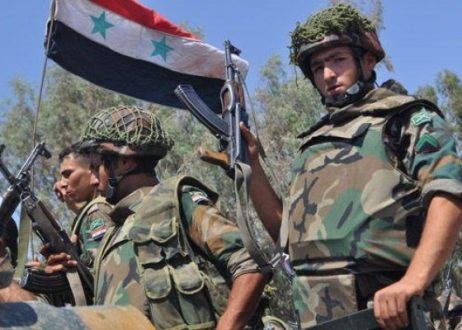Syria army seizes famed Crusader fort in border push
DAMASCUS – Syrian regime forces seized the famed Crusader fort Krak des Chevaliers on Thursday, marking a significant advance in their drive to seal the Lebanese border and sever rebel supply lines.
“The Syrian Arab Army raises the flag of the nation over the Krak des Chevaliers castle in Homs province, after crushing the terrorists who were holed up there,” state television said.
The government forces entered the fort, which had been under opposition control since July 2011, after fierce clashes in the nearby village of Al-Hosn.
Lebanon’s Al-Mayadeen TV, a private broadcaster sympathetic to Syria’s government, broadcast live images showing regime forces atop one of the castle’s towers, raising the Syrian government flag.
A pro-regime militia chief said the fighting left at least 40 rebels dead, including the leader of the jihadist Jund al-Sham, Khaled al-Mahmud.
He was better known by his nom de guerre Abu Suleiman al-Muhajer, the National Defense Forces commander said.
The offensive in the Krak des Chevaliers area is one of two major operations by the Syrian army near the border with Lebanon aimed at cutting off rebel supply routes.
The army, backed by fighters from Lebanon’s Hezbollah movement, is also fighting to seal the border in the Qalamun region, where it seized the last major rebel bastion of Yabrud on Sunday.
Charles Lister, a visiting fellow at the Brookings Doha Centre, said he expected the army to win more strategic victories along the Homs and Damascus province borders with Lebanon.
Losing the border would have limited effect on the opposition’s weapons supplies, he said, but “in terms of general logistics, communications, and small localized safe havens, its value is well established.”
As the army shelled the area around Al-Hosn, dozens of people tried to flee for neighboring Lebanon.
The Syrian Observatory for Human Rights reported 60 people “killed or injured” as they fled for the border.
The Britain-based Observatory was unable to confirm a precise death toll, but said that among the casualties were both civilians and fighters.
A Lebanese security source said some 60 people were wounded by army fire as they crossed the river that divides the two countries.
Syrian army tanks also shelled the border area, causing at least one house in northern Lebanon’s Wadi Khaled district to burn down.
“The situation is very bad,” Wadi Khaled doctor Tareq Dandashi told AFP.
“The whole of Al-Hosn has fled to Lebanon, and the Syrian army has been targeting them as they crossed over,” he said.
Wadi Khaled resident Khaled Hussein said 130 Syrians had tried to flee to the town on Thursday, but many had been killed or injured trying.
‘Bodies in the river’
“There are still bodies in the river” that separates Lebanon from Syria, he said.
The mainly Sunni Muslim area of north Lebanon, whose residents are largely sympathetic to the rebels fighting to overthrow Syrian President Bashar al-Assad, has come under frequent cross-border shelling by his forces.
It is home to thousands of families who have fled the three-year-old conflict.
Sunni protesters in northern Lebanon took to the streets and set up roadblocks of burning tires to express their solidarity with people in Wadi Khaled.
The Lebanese army meanwhile closed off unofficial border crossings in the north, citing the danger caused by the artillery fire.
The flare-up on Lebanon’s northern border came hours after twin Syrian air raids Wednesday night hit the Arsal area, on the eastern border, without causing any casualties, a Lebanese security source said.
The Arsal area, which hosts tens of thousands of Syrian refugees, has been hit by repeated cross-border fire in recent months, some of it deadly.
Smuggling routes used by opposition forces to move fighters and weapons back and forth between Lebanon and Syria pass through the Arsal area.
Dominated by Damascus for 30 years until 2005, Lebanon is deeply divided over the conflict in neighbouring Syria.
Shiite Hezbollah and its allies back Assad, while the Sunni-led opposition supports the revolt.


